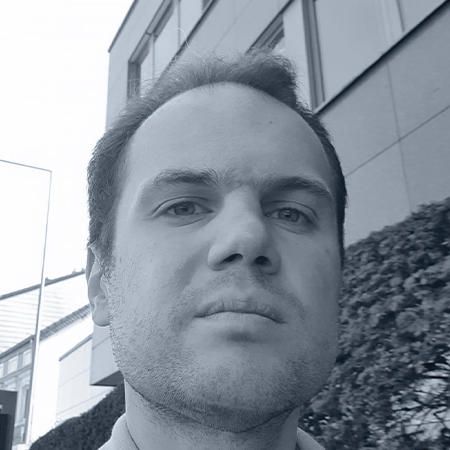
Dimitri Bogdanowski
RWTH Aachen University,
Materials Chemistry
Contact
Kopernikusstraße 10 (RWTH building 2162)
52074 Aachen
materials_design@nhr4ces.de
LinkedIn ResearchGate
Biography
Dimitri has received his Bachelor (2010) and Master of Science (2012) degrees in Chemistry at RWTH Aachen University, specializing in computational/theoretical chemistry, instrumental analysis and materials science during the latter. He obtained a Dr. rer. nat. degree at the Institute of Inorganic Chemistry of the RWTH (with Prof. Richard Dronskowski) in 2019, investigating local ordering phenomena and defects in (Fe,Mn)AlC and their impact upon energetics and electronic structure by means of density functional theory (DFT) simulations.
Since 2020, Dimitri is a postdoctoral researcher at Materials Chemistry (Prof. Jochen M. Schneider), mainly focused on DFT-based predictions of phase stabilities and thermodynamic potentials, as well as quantum-mechanical chemical bonding analysis. His secondary research area is experimental work in the field of physical vapor deposition of thin films and their characterization. Within NHR4CES, he will be contributing to the generation of machine-learning interatomic potentials for molecular dynamics from DFT data in the Materials Design Simulation and Data Lab.
Thematic Advice
With his background in computational chemistry methods and their utilization in massively parallel processing/high performance computing systems, as well as the automation of data postprocessing from typical computational chemistry simulations, Dimitri can advise and assist researchers and graduate students who are branching out into computational chemistry/materials science, particularly regarding electronic structure analysis. Furthermore, as much of the computational materials science community consists of physicists, he can provide advice and input from a chemistry-focused point of view, typically more concerned with local properties and the nature of chemical bonds.
Professional Competence
Dimitri has acquired extensive experience in the field of density-functional-theory-based computational solid-state chemistry, focusing on total energy calculations for phase stability predictions, electronic structure and bonding analysis, modeling of disordered and defect-containing structures and prediction of thermodynamic properties using lattice dynamics simulations. He has extensive experience with quantum-chemical simulation software, primarily VASP, supplemented by Wien2K and QuantumESPRESSO, in-depth knowledge of the LOBSTER package for electronic structure and chemical bonding analysis, and extensive familiarity with the phonopy package for lattice dynamics. He also is familiar with the OpenMX and LAMMPS software for DFT-based and classical molecular dynamics simulations, respectively, and possesses intermediate-to-advanced shell and Python scripting skills for automated data postprocessing.
Dimitri has collaborated with materials scientists and engineers frequently in the framework of the Sonderforschungsbereich 761 “Stahl ab initio” (third phase, 2015-2019), has given numerous scientific talks (both results-oriented and methodological/introductory) and has served as a reviewer for ACS and MDPI journals.